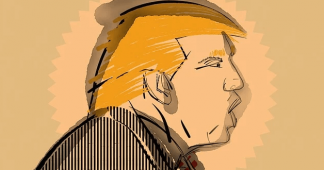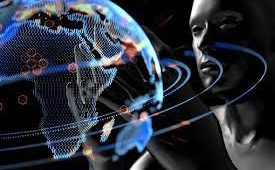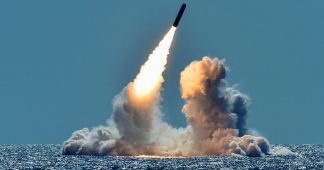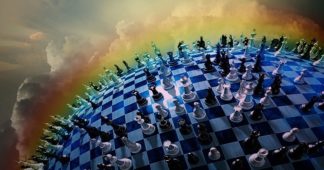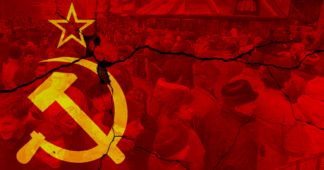By Dimitris Konstantakopoulos*
The present still dominant global economic system is a generalized, expanded and globalized form of the one prevailing in western capitalism during the 19th century, based on the same neoclassic economic doctrines.
The previous form of “neo-classic” capitalism has provoked the two big economic crises (1873 and 1929), two world wars, the Russian Revolution and the rise of Nazism in Germany. It is only natural that the domination of the same, albeit expanded and globalized model after 1980 and 1990 has already provoked the global economic crisis in which we live since 2008. It has brought us to the brink of a world war that would have already been launched, if not for the existence of nuclear arms. And this model is also accelerating our descent into a climatic and environmental holocaust. After all such a turn of events is only natural, to the extent that the basic value underlying “neoclassic” and “neoliberal” economics is the “unhindered” competition – and in fact mortal struggle – of all against all. A world war or a war against our natural environment is nothing else than the unavoidable result of the quest for absolute power and an always accelerating – by all means – accumulation of Capital, which is characterizing the fundamental functioning of the social system. This is where economy, geopolitics, ecology and culture are meeting.
1980-90: The neoliberal and neoconservative triumph
It was only in the political conditions created globally, as a result of the mainly Soviet victory over Nazism, in 1945, that we have seen the reaffirmation of the New Deal principles in the US, the establishment of a social democratic compromise between Labor and Capital in Europe and the emergence of more independent regimes in China and a number of former colonies.
This post – WWII equilibrium is challenged by the attack of the Big Capital using the Neoliberals under the leadership of Ronald Reagan and Margaret Thatcher as their force de frappe. A new economic model is imposed in the ‘80s, codified in the Washington consensus. The collapse, if not suicide of the Soviet bureaucratic regime between 1989 and 1991, towards a radical neo-capitalist, neoliberal and cleptocratic direction, constitutes a global triumph for the new dominating paradigm. Basic international institutions like the WB, the IMF and the WTO are reformed according to the new economic model. All restraints to the acticity of the financial capital, imposed after the 1929 crisis, are abolished. Europe is adopting the Maastricht Treaty by which neoliberalism is recognized as a basic constitutional principle of the new European sui generis “superstate”. This Treaty also makes official the ultimate authority of NATO upon the foreign and military policy of the EU. The rise of the Neocons, the demise of the whole international Arms Control structure, the constant expansion of NATO and the wars in Yugoslavia and the wider Middle East are not but the geopolitical corollary of this massive shift of the correlation of power between Capital and Labor, dominant and exploited nations.
We repeat what we already stated. In analogy with what happened in the past, we are advised to look into the triumph of this model in order to find the deepest reason we are again in the verge of a Third and the final if it will happen new World War. A War that would have been already launched if not for the existence of nuclear arms. This is only natural by the way. If the general struggle of everybody against everybody is the main rule in economy, then all sorts of wars are a normal result.
The integration of the former “socialist” Bloc into global capitalism has been the moment of triumph for the new model and the foundation to the claim of “unipolarity”, although there have been three important exceptions to this integration, the significance of which has now become obvious. First, Russia retained partially some of the mechanisms and the degree of independence of the Soviet state, born out of an anti-capitalist, socialist revolution and, with them, a nuclear arsenal which ensures strategic parity with the US. Second, in China, despite the extensive use of foreign capital and very large concessions to capitalism, the regime has retained the degree of independence it has inherited from the 1949 Revolution. China remains a non – capitalist country with a planned economy, albeit not directed by administrative but by market methods and is refusing to succumb to the financial globalization, that is to the global power of the international Finance. Third, the massive Western military interventions in the greater Middle East have transformed a large part of it into a zone of ruins but they were unable to suppress the forces of resistance in the region and integrate it smoothly into the West.
The moment of crisis
Today, more than forty years after Reagan’s and Thatcher’s triumphs, more than thirty years after the Soviet collapse and the establishment of the EU, the dominant global economic model has not achieved any of the basic aims it set itself and its theoreticians believed they would be achieved because of its unhindered implementation. On the contrary it has exacerbated a series of serious problems and crises, some of them even threatening the very survival of humanity and has brought us on the verge of a new World War:
- Western capitalism has entered into a permanent and deep economic crisis since 2008, something not foreseen by the model. The states returned to undertake critical roles in order to rescue, regulate and “guide” the “markets”. The crisis caused widespread social destruction, even the destruction of the economy of whole states (as in Greece, the scapegoat of the European debt crisis) and is keeping under enormous pressure what remains of democracy and of the nation – states in the West, for example in France. The dominant system did not let the markets do their job, that is, bankrupt the banks, as it was said that they were “too big to fail.” Instead of banks failing, whole states and societies are failing now.
- The present model is based on the possibility of “fair and unhindered economic competition” between multiple economic players. But we never had in history such an enormous international concentration of capital in limited monopolistic or oligopolistic structures, with one after another large and vital economic sectors, like food, medicine, information, etc. succumbing to oligopolistic control, under the general auspices of financial capital.
- The model is based on the assumption that the “global market” is headless, it has no leader who decides, much less a “dictator” who can violate its own laws. But already the role of the dollar, the SWIFT system, the control of Internet by a handful of big firms, the role of the private rating agencies, etc., combined with the centralization of finance capital and the abduction of processes that have traditionally belonged to the power of states (such as the indirect abduction of the privilege of money production through the derivatives industry) disprove this picture. Today, the Big World Finance Capital acts like the Politbureau of the CPSU once did, violating the law of value itself if it fits this normal. Today the United States have imposed sanctions on dozens of countries worldwide, while openly stating that a situation where China, while playing by the rules of the system, can become a power economically stronger than America, is completely unacceptable because it does not meet their political perceptions. Something that was never required by the way when this state was accepted as a member of the WTO. The West is proclaiming all the time its support for a “rules based international order”, but it is itself, which violates constantly those rules.
- The dominant model is supposed to ensure, through the mechanisms of the market and competition, the continuous increase of productivity and ultimately, its distribution equitably by pulling “up” the most backward social strata and countries. But in reality, we are witnessing an explosion of inequalities both between states and within states, while the structure of products produced tends increasingly to include anti-social and anti-ecological ones. Instead of going to the Kantian “eternal peace” and the “end of history” predicted by the theorists of this school, we went to the generalization of increasingly dangerous wars, but also to the generalization of a disintegrating insecurity of citizens and of whole countries throughout the planet. A large part of humanity is struggling under an enormous Debt while a small number of companies and individuals have accumulated a mythical portion of the wealth of the world, threatening to enslave all humanity, if a decisive obstacle to their power is not created. At present, after the rapid retreat of the Workers ‘ Movement in the West, only multipolarity can be a necessary, though not sufficient condition for avoiding such an enslavement of all humans.
- Where the system of “free and sovereign markets” seems completely incompetent is in dealing with vital problems and even problems of survival of humanity, in particular as we are transcending the natural limits of the planet, we are facing a generalized pollution of the environment, climatic crisis, the control of information and its circulation by a handful of private companies, the development of very dangerous and socially unchecked technologies, such as biotechnology, artificial intelligence, biochemistry, neuroscience and many others, technologies which are capable of causing the destruction of the human species or forming the basis for a totalitarian “society”.
- The global economic system is promoting, objectively and subjectively, by its very functioning and everywhere, local elites which undermine the push of one or another nation or region to more sovereignty and independence.
These are some of the reasons why it is urgent that the Washington Consensus be replaced by another economic system, on a national, regional and global scale. If the quest for multipolarity is the necessary, only the gradual creation of a new global economic, social and ecological order is the sufficient condition to confront the growing threats to human civilization and our very existence. But on which principles can and should be founded such an alternative to the present model?
What alternative to the present model?
“Correction” may also be made preferably by using economic tools. Administrative measures should be avoided as far as it is possible. For example, China is already experimenting with definitions of GDP that include the natural capital spent or created by a product or investment. Actually, when a plane is transporting for example salads from Chile to Norway, nobody takes into account the damage done to the Earth’s stratosphere while calculating costs and prices. By the way there are, of course, more and more economic activities that expose ecosystems to the risk of irreversible changes. When the risk from an activity has very small chances to appear but enormous costs when it occurs, the ‘expected damage’ tends to Infinity. Such activities should be phased out gradually.
Private ownership of very large productive forces cannot be allowed. It is unacceptable for a handful of people/companies to be able to control critical productive forces or cutting-edge technologies as they are, for example those involving DNA and genetically modified organisms, the manufacture of viruses, the movement of information on the internet, cyber-weapons, large energy and money flows, artificial intelligence and many other economic or technological activities, or being able to decisively influence the directions of human nutrition, education and medicine, or to control monopolistically or oligopolistically the media (Press, television, Internet). State or social control is not enough, because the owners of these powers acquire such disproportionate power that they prevail, as experience has shown, over any regulation.
Ownership in these sectors must pass into the hands of the states and societies and, as far as possible, in perspective, be controlled internationally. But also management itself must move away from the classic model of state control, which creates a class of managers who ultimately operate for their own and not for the social benefit. Moreover, the effectiveness – even at the purely economic level – of classical strict state control has been shown to be limited by both the Soviet experience and the experience of the state sectors of capitalist states and former colonies.
In order to do this, the simultaneous application of methods of self-management and social control is necessary, in order to take into account the general interests of society as a whole and not only of workers in a production unit or industry. The management of new productive forces and technologies by a hyper-centralized system is neither possible or desirable, in the long run. The problems humanity is facing require and are better addressed in the long term by an overall raising of the level of diffuse intelligence in society, people who are increasingly conscious and also responsible, and to be conscious and responsible they have to be involved actively in decision-making at all levels.
It is also obvious that we need the gradual democratization of the international monetary system, perhaps by establishing regional monetary instruments, but also by the creation of a system of international exchanges that will try to overturn the law of “unequal exchange” as formulated by Argyris Emmanuil, by taking into account both the need of raising the level of the poorest nations and the ecological problems. It is important to remember at this point that the Soviet Union was, in contrast to the European Union, an organization which organized the transfer of surpluses from the richest to the poorest regions, an idea that Maynard Keynes, in different terms, had advocated for the functioning of the international economic system, by blaming also permanent surpluses. In regulating international economic exchanges it must be taken into account the need to address inequalities globally and the need to protect the environment which makes life and civilization possible.
Of course you can tell me at this point as Faust said: Show me the goal, but show me also the path to achieve it. It is not possible even to make a short allusion to it in the context of an aricle. But it is also impossible to describe in detail such a path, there can not be any prefabricated way for what Marx described once as the transition from pre-history to history. We are still a long way from being able to implement these ideas on a global scale. At present, and given the political and social trends currently prevailing in the West, a necessary transitional stage must include the struggle for a multipolar world and the attempt to form independent regional associations, for example in Latin America or Africa. It is appropriate, however, to introduce in this process elements that will contribute to the general reformation of the world system, elements that one hopes will help to induce in the West itself a brave radical tendency, without the timely appearance of which the chances of a global ecological or nuclear catastrophe are significantly increased.
* This article incorporates the main points of a speech by the author to the Moscow Academic Economic Forum in June 2023.
Also read Multipolarity: The need for a positive content
We remind our readers that publication of articles on our site does not mean that we agree with what is written. Our policy is to publish anything which we consider of interest, so as to assist our readers in forming their opinions. Sometimes we even publish articles with which we totally disagree, since we believe it is important for our readers to be informed on as wide a spectrum of views as possible.

